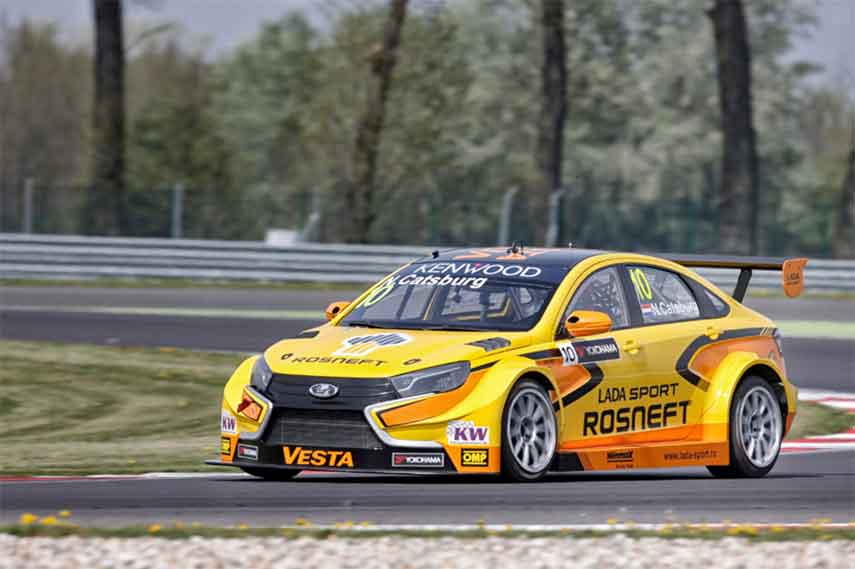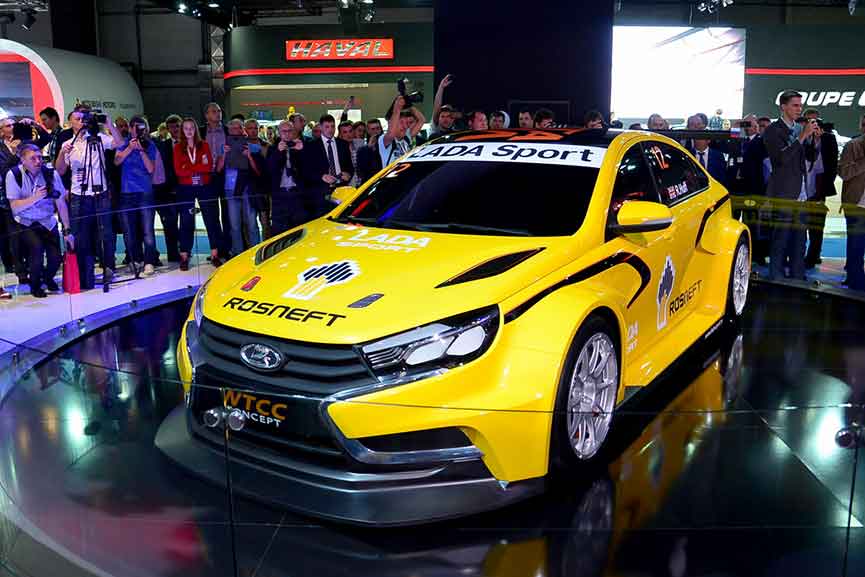Lada Vesta WTCC Clears a Long Way to the Top
Russian manufacturer Lada entered World Touring Cars Championship in 2012 with a Granta model which scored only two race wins in three years. Lada Sport Team had bigger ambitions and to realize them needed a better car. The choice was Vesta model, relatively small family car which production has started in 2015, at AvtoVAZ’s factory in the city of Izhevsk.
Designed by British designer
New Lada Vesta model was presented in August of 2014, at International Automobile Salon in Moscow and quickly became one of the best-selling cars in Russian and the markets of some former Soviet Republics. Design always was an issue for the Russian cars, but Vesta looked modern thanks to the work of Steve Mattin, a well-known British designer who also worked for Volvo and Mercedes.

Lada Vesta road version
Road version of Lada Vesta developed by Renault-Nissan Alliance is 4.4 m long, 1.76m wide and 1.5 m high, with a wheelbase of 2.63m. It has the 1.6l engine and five-speed automated manual transmission.
Improved engine
The WTCC version of Lada Vesta is developed with French company Oreca which is an engine supplier. The 380bhp turbo engine was significantly improved in comparison with the unit used in the Lada Granta. The concept of the Lada Vesta WTCC car is aggressive in design. On the front Lada Vesta has a sporty spoiler with a carbon fiber splitter, a ventilated hood and widened fenders. There are also lightweight wheels, an impressive rear wing and performance brakes.

Lada Vesta WTCC is still looking for the first win
Lada was in trouble to meet FIA’s maximum weight conditions with Granta models and probably that was the main reason of underachieving during three years. Vesta is lighter and looks like more competitive, but the results during the first season weren’t as good as it was expected.
Slow improvement
In the Manufacturers’ championship, Lada Vesta couldn’t parry to Honda and especially to Citroen. Russian team scored a total of 360 points, what was half of the points scored by the Japanese manufacturer and three times less than French manufacturer.

Lada Sport Rosneft prepared three Vestas for the 2016 WTCC season
Reliability of the cars was a big problem, especially in the first half of the season. But, as the season progressed, Lada Sport Rosneft team and Lada slowly started to improve and soon at least one car was in the points zone. Unfortunately, only one podium finish was scored in 2015, by Rob Huff in the race 2 at Moscow Raceway.
Lada Vesta finally scored maiden WTCC win
For the 2016 campaign, with a refreshed drivers line-up, with better prepared Lada Vesta, and with a new optimism, results continued to improve. After three opening rounds and six races, Vesta finished on the podium in two races and looks much more competitive in the terms of speed and especially reliability.

Nick Catsburg in Lada Vesta WTCC
Finally, the same year, Lada scored first victory. The happiness was even bigger after both wins were achieved during the WTCC Race of Russia at Moscow Raceway. Gabriele Tarquini was the hero as he has won the opening race while Nick Catsburg was the fastest in the main race.
Lada Vesta WTCC TC1 specifications
Body: Sedan, with in-welded safety body shell
Length: 4628 mm
Width: 1950 mm
Wheelbase: 2685 mm
Minimum weight: 1100 kg, including driver
Engine type: Global Engine Lada
Displacement volume: 1.6 turbo
Top power (HP): 360
Max. torque (Nm/rpm): 440/4000
Transmission: Front-wheel drive
Gearbox: 6-speed sequential gearbox, Xtrack
Front and rear suspension: McPherson, specially designed springs, adjustable gas shock absorbers, adjustable stabilizer
Front brake caliper: four-piston, AP Racing
Front brake discs: Ventilated, 387.5 mm in diameter
Rear brake caliper: two-piston, AP Racing
Rear brake discs: Ventilated, 280 mm in diameter
Wheels dimensions: 10c18
Youtube video – Lada Sport Vesta WTCC at Slovakiaring
Photo: lada-vesta2.ru lada.ru fiawtcc.com






